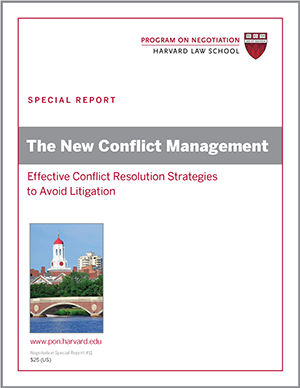
What are social psychologists learning about the connections among emotions, negotiators, and decision making? Negotiation Briefings contributor Jennifer S. Lerner of Harvard Kennedy School and her colleagues have identified two critical themes.
First, they have studied the carryover of emotion from one episode, such as a car accident, to an unrelated situation, such as a workplace negotiation.
Second, these researchers are studying the influence of specific emotions such as happiness, sadness, and anger on decision-making.
In related work, Robert Lount and Keith J. Murnighan of the Kellogg School of Management at Northwestern University considered the role of specific emotions of negotiators in a classic trust game. In this game, which is typically played for real money, player 1, the ‘trustor,’ must decide how much of $10 to give to player 2, the recipient. Player 2 receives three times the amount given by player 1; player 2 then must decide how much (if any) of this expanded total to give to player 1. The efficient solution is for player 1 to give the full $10 to player 2, who can then divide the $30 between them.
In their version, before beginning the game, Lount and Murnighan asked some trustors to write about an experience that made them happy and asked other trustors to write about an experience that made them sad. They then played the trust game. Among “happy” trustors, 53% gave recipients the full $10; only 21% of sad trustors did the same. On average, happy trustors gave away $6.76 and sad trustors gave away $5.58.
It appears that a negotiator’s sad mood decreases trust and negatively influences negotiated outcomes. As this research shows, you would do well to avoid carrying emotional baggage into your most important negotiations.
Example of negotiation in daily life: Imagine you’re about to negotiate with a competing firm about a possible merger.
You enter the conference room and find a reasonable and fair representation from the other company, negotiators you’ve reached mutually beneficial agreements within the past. But you’re in a terrible mood: on the way to work, you were rear-ended by a distracted driver talking on his cell phone. As you sit down at the negotiation table, you contemplate the hassle of repairs and insurance claims. Even though you’re still seething, you’re certain that you can separate your rage from the task at hand. But can you?
Probably not. Emotions of all types alter our thoughts, behavior, and underlying biology. In negotiations, the fact that integral emotions—feelings triggered by the negotiation itself—affect outcomes is well documented. For instance, if you found yourself negotiating with an old nemesis, you would experience integral anger. We now know that incidental emotions, or feelings unrelated to the negotiation at hand, also can have a significant effect on negotiations.
How to Defuse Your Emotional Triggers Before Negotiation
To recognize and defuse your own incidental emotions, start by identifying your emotional triggers. A nationwide study led by Nobel Laureate Daniel Kahneman of Princeton University showed that Americans become most distressed when commuting or when talking to their bosses. Could these triggers be affecting your negotiations (see also, bias in negotiations)? Awareness of this possibility will improve your odds of recognizing the effects of such triggers in the heat of the moment.
Bargaining Strategies to Defuse Your Counterpart’s Emotional Triggers During Negotiation
To recognize and defuse an incidental emotion in your counterpart, remember that her mood may have nothing to do with you. If you suspect that the other side’s feelings are incidental to the negotiation, encourage her to draw a connection to the source of these feelings. Open-ended questions such as “Terrible day out, isn’t it?” or “How was the drive over?” can go a long way toward minimizing the influence of negative emotions on judgments and choices.
How do you think mood affects negotiators? Share your thoughts in the comments.





No Responses to “How Mood Affects Negotiators”